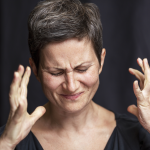Previous studies have shown that women with poor physical health are more likely to suffer from depression during the perimenopause and menopause. A new study demonstrates that in healthy women, there is also a correlation between physical health and mental well-being.
This study focused on upper body and lower body strength in a group of healthy women aged 45 to 69 years seen for routine gynecologic care. Of the 1,159 women evaluated (mean age 56.3 ± 6.2), 181 (15.9%) were identified as having depressive and/or anxiety symptoms as measured using the Center for Epidemiologic Studies for Depression Scale (CES-D) and the General Anxiety Disorder Scale (GAD-7).
Weaker upper body strength (handgrip strength) and poor lower body strength (longer duration to complete the repeated chair stand test) were associated with elevated depressive and/or anxiety symptoms (adjusted odds ratio [aOR], 1.68; 95% CI, 1.18-2.40) and (aOR, 1.33; 95% CI, 1.09-1.63), respectively.
While this finding is interesting, there are alternate explanations. For example, it is possible that the women who have more time for self-care and therefore prioritize staying fit, may experience less stress and are, as a result, less vulnerable to anxiety and depression. It is also possible that women who suffer from depression and anxiety are less likely to exercise. Future studies are needed to determine whether strengthening exercises which improve physical performance could be useful in either preventing or reducing depression and anxiety in midlife women.
Ruta Nonacs, MD PhD
Ganasarajah S, Sundström Poromaa I, Thu WP, Kramer MS, Logan S, Cauley JA, Yong EL. Objective measures of physical performance associated with depression and/or anxiety in midlife Singaporean women. Menopause. 2019 Jun 3.








Leave A Comment